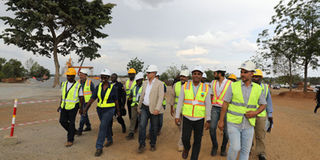Focus shifts to Eastern roads

UNRA executive director Allen Kagina inspects ongoing works on the Tirinyi-Pallisa-Kumi Road (67Km) and Pallisa-Kamonkoli (44Km) Road recently. The roads are under upgrading or construction by the Arab Contractors. COURTESY PHOTO
What you need to know:
A total of 482 kilometres of roads in eastern Uganda are under construction currently, while 439 kilometres of other roads are under rehabilitation, making a grand total of 921 roads under works in the region, Franklin Draku writes.
Uganda National Roads Authority (UNRA) has embarked on massive infrastructure development in the Eastern Uganda, with 482 kilometres of roads under construction across the region.
The eastern section development follows massive road works along the Albertine Graben ahead of oil production and other construction works across the country.
During the presentation of manifesto implementation status report on Thursday, the Minister of Works and Transport, Engineer Monica Ntege Azuba said the government has steadily increased the kilometres of both newly constructed roads, and rehabilitation of the old ones.
She said between 2016 and 2018, a total of 632.1 kilometres of new roads were added to the tarmacked national road infrastructure.
She also said between now and the end of the year, government will add another 382 kilometres of paved roads, bringing the total to about 1.014 kilometres.
This will be in addition 308 kilometres of roads whose contracts have already been signed and work is expected anytime.
Currently, Western Uganda takes the lion’s share of the tarmacked road network in the country with over a thousand kilometres of roads constructed.
Since the beginning of this decade, government has signed a number of contracts with different contractors for construction of oil roads in the Albertine Graben.
Under the programme, a total of about 700Kms of roads have either been, or will be upgraded to bitumen standard in preparation for oil production.
Between 2012 and 2017, Unra spent more than Shs3.8 trillion on the rehabilitation of 18 major tarmac roads and upgrading 12 others from murram to tarmac, with the largest share of money and kilometres worked on going to western Uganda.
Roads
Figures obtained from Unra in regard to 27 roads totaling to 2,274.5km revealed that Western Uganda took Shs1.8 trillion, which represents 49 per cent of the roads money and 687.4km of road network, representing 30.22 per cent of the length of roads that were worked on.
Northern Uganda took Shs480.96 billion, which is 13 per cent of the funds and 386km, which represents 16.97 per cent of the total number of kilometres that were worked on in the said period.
Eastern Uganda got Shs598.67 billion, which is 16 per cent of total spent and 362km which represents 15.91 per cent of the total number of kilometres fixed.
The smallest potion of the money went to central Uganda, which got Shs466.3 billion, representing 13 per cent of the funds and 295km which represents 12.96 per cent of the length of roads worked on.
Roads shared across regions amounted to 544kms which represents 23.91 per cent of the total number of kilometres worked on.
East gets its share
Currently, a total of 482 kilometres of roads in the eastern Uganda are under construction, while 439 kilometres of other roads are under rehabilitation, making a grand total of 921 roads under works in the region.
Some of the roads include; Tororo-Mbale-Soroti Road 150.8Km, Soroti-Dokolo-Lira-Kamudin Road [189Km, both for rehabilitation and maintenance funded by World Bank.
Others are; ongoing construction of Sigulu Ferry in Namayingo, construction of Musita-Lumino/Busia-Majanji Road. 104km, with progress at 87.4 per cent, construction of 44.5km Bumbobi-Lwakhakha Road. 44.5km, with progress at 38.73 per cent and Kapchorwa- Suam Road. 73km. Progress at 1.89 per cent
Also under construction are; the100km Soroti-Katakwi-Akisim Road at 71.17 per cent, the 50.3km Akisim-Moroto Road at 95.4 per cent, the 111km Tirinyi-Pallisa-Kumi/Kamonkoli Road with progress at 9.2 per cent and rehabilitation of the 99.3km Nakalama-Tirinyi-Mbale Road at 39.52 per cent.
UNRA’s corporate affairs manager Mark Ssali, said the region is now the focus of road constructions. He said this will improve road coverage network in the region and access to hard-to-reach areas.
“As far as ongoing projects are concerned, the East is actually where we are doing most work currently, with 482km of roads under construction, and 439km under for rehabilitation, all at different stages. There is also an entire network of gravel roads under maintenance,” says Mr Ssali.
A week ago, the top leadership of the Authority took field tripS to the eastern region to assess the progress and quality of work on the roads. The trip included a visit to the MV Sigulu ferry that is being constructed at Masese Landing Site, Walukuba-Masese Division in Jinja Municipality, is in advanced stages.
Mr Ssali said the visit will help speed up the construction works, and ensure the right quality of work is done.
“Our ED Madam Kagina and a technical team took four days away from office last week to inspect all these projects, meeting our engineers and the contractors, as well as project affected persons, the communities and their leaders,” he said.
Oil
Recently, government announced the discovery of oil leaks in the Elgon region, raising prospects of commercial availability of oil in the area.
When the Albertine region registered presence of oil deposits, it was followed by massive infrastructure development, which among others, include the 700kms of oil roads, Kabaale Airport, industrial parks and associated infrastructure.
Asked whether government will shift its infrastructure development focus the east if commercial oil deposits are discovered in the region, Mr Ssali said that decision will be made at a later time, if the current infrastructure falls short of the demands.
“Oil related infrastructure is based on needs of partners to facilitate oil production as determined by Ministry of Energy. Should the need for oil related road infrastructure arise over and above current road infrastructure works anywhere in the country, UNRA will provide the support required,” Mr Ssali said.




